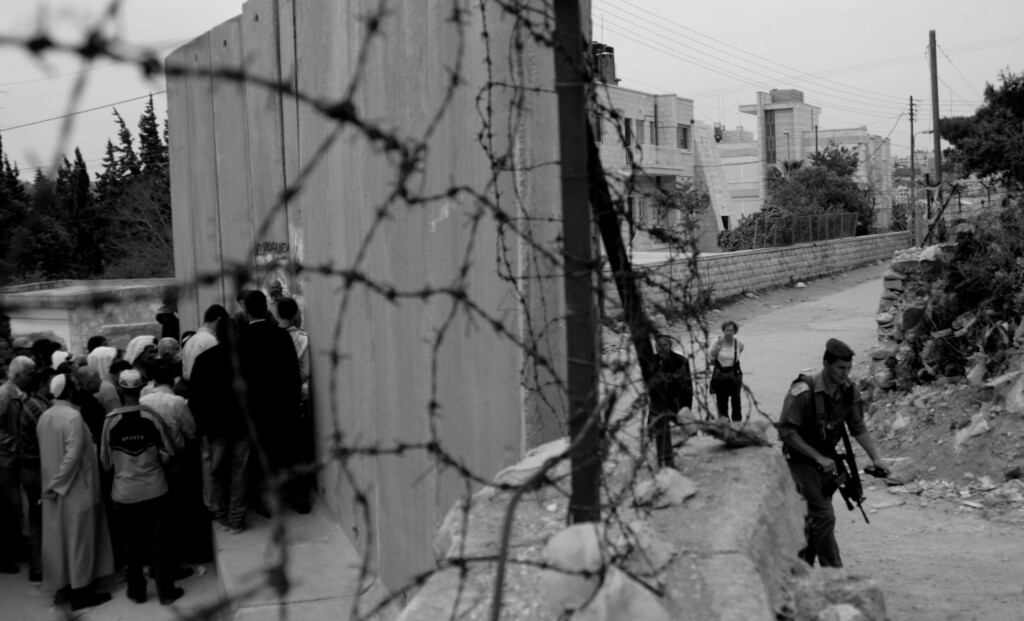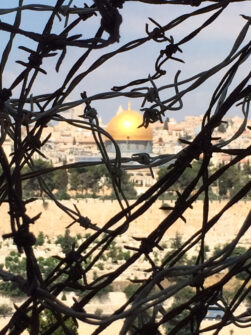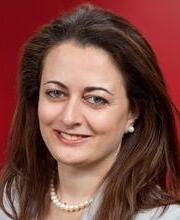
In this post, I share some of my personal experiences with Archbishop Desmond Tutu during his life and his impact on Israel/Palestine. The core of my reflections connects Tutu’s calling to pursue justice and the resonance of that calling with the Palestinian quest for liberation. In his practice, he embodied both the ideals of justice and liberation in ways that called on us to recognize our common humanity.
I grew up under Israeli military occupation in the city of Ramallah. I am the daughter of an Anglican pastor, a Nakba survivor from Al-Lidd (Lydda), who was a deputy mayor prior to becoming the mayor of Ramallah.
Having grown up in a household that was not only focused on activism but was also religious, my understanding of what it meant to be both Palestinian and Christian was intertwined with the pursuit of justice. My Christianity placed justice at its core, and it was a justice that guaranteed that each human being had equal worth. Likewise, my Palestinian-ness was very much built around a strong sense of justice, and this included seeing the Palestinian struggle in partnership with other struggles for liberation in the world, which included South Africa.
As a little girl, I remember skipping around our home singing along to a familiar refrain I heard daily on the news hour of radio Monte Carlo: Free, Free Nelson Mandela!
Another memory I have is of a visit to our home by a bishop from Namibia, who taught us to sing their song of freedom. I don’t remember the words of the song he taught us, but I remember it ending with Namibia and us lifting our fists in a gesture of solidarity and acknowledgment of their struggle for freedom. I remember this visit vividly as it inspired me to know more about other people’s struggles for liberation; it made me feel that I was part of a larger collective, which in turn gave me hope that we might all overcome oppression.
My teenage years started with the onset of the first intifada in 1987. This shaped me in ways that continue to guide me in my life to this day. It was during these years that we cultivated what we refer to as the “culture for liberation,” and that I developed a heightened awareness of the struggle to end Apartheid in South Africa. Like many Palestinians, I recognized that our struggle for freedom in Palestine was the same as that in which opponents of Apartheid were engaged with in South Africa. It was during this time that Archbishop Desmond Tutu became a household name for us.
Archbishop Desmond Tutu was loved by all Palestinians, Christians and Muslims. His message was simple: God created us for freedom. This is a freedom that does not belong to one group of people more than another. Here was a courageous church leader who centered justice within his Christianity and whose South African-ness was likewise concerned with justice for a greater humanity. I strongly resonated with the connection between one’s identity as a Christian and the struggle to end injustice wherever one faces it.
His message was simple: God created us for freedom. This is a freedom that does not belong to one group of people more than another.
Archbishop Tutu visited Palestine in 1989 during our first intifada, before Apartheid had ended in South Africa. Unfortunately, his visit took place while I was away at college and I missed meeting him. Nonetheless, many of my family members and friends remember his visit and I still recall how his arrival captivated all of us. The pressures on him were immense, and his visit with us was not welcomed by the Israelis. In fact, some hateful graffiti welcomed him to Jerusalem. Outside the walls of the St. George’s Cathedral in Jerusalem, some Israelis had scrawled: Go Home Black Nazi Pig. In the church service he led that day he began his sermon by making a joke about the graffiti. Later, I learned much more about the nature of this joyous remarkable man, but here was an early example from my memory.

My friends can still recall the church service in the shepherd’s fields in the Bethlehem area on Christmas Eve. The fields were overflowing with people coming to hear the archbishop and the area was also surrounded by Israeli soldiers. The atmosphere was tense as those in attendance did not know how the soldiers would react to the crowds or to what the archbishop had to say. In his sermon, many recall Tutu describing situations that were familiar to them— humiliations at checkpoints, home demolitions, mass imprisonment, deportations, etc.—and at the end of his descriptions he would say that “of course” he was talking about apartheid in South Africa. The crowd would erupt in laughter. They heard him speak to the situation that they faced, and in doing so he further solidified the idea that our struggles were integrally linked. During this same visit, he met with the burgeoning Palestinian liberation theology movement that was just evolving. He later became the international patron of that same movement—now called Sabeel.
It wasn’t until 2007 in Boston that I had the honor and privilege of meeting Archbishop Tutu in person for the first time. I was one of the main organizers of a Friends of Sabeel conference, which aimed to highlight the apartheid situation in Israel/Palestine. Archbishop Tutu agreed to be our keynote speaker.
Experiencing Archbishop Tutu in person was not only a personal highlight that I will always cherish, but one that endeared a hero of mine to me even further. Being able to spend time with him commuting from one place to another I was able to witness his boundless joy, his humor, and his cheeky way of getting his messages across. There were several instances where we got lost on our way to somewhere and he was always ready with a witty remark followed by his adorable chuckling.
At the conference itself we were met by hecklers across the street from Old South Church, where the conference was taking place. At a moment when we weren’t paying attention, we found the archbishop across the street speaking with the pro-Israel protesters, who seemed stunned and were all of a sudden in silence. At the conclusion of the conference, we held a rally in Copley square, and we witnessed the archbishop dance through the crowd of hecklers on the way to the Square. That day we were all fortunate to have experienced this joyous, fearless, dancing archbishop who could not remain silent about the world’s injustices.
As I reflect today on the legacy of Archbishop Desmond Tutu, I recognize how privileged I was to have experienced him in person. I also recognize the tremendous impact that he has made in the world because of his character and commitment to justice, both of which I was able to see him embody during that conference. I feel strongly that his message that “God created us for freedom” was what led him in his path to speak for those seeking liberation, to use his platform to speak truth to power, and never to waver in his message. For Palestinians, whether Christian or Muslim, we saw him as our voice precisely for this reason.

